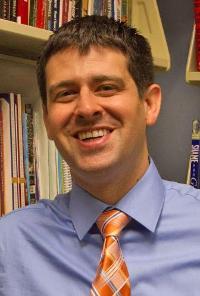August 4, 2021
The John Templeton Foundation Grant will be funded for three years.
 A movement has been gaining momentum in the sciences for several years. It’s called the Open Science Movement and encourages transparency, integrity, and reproducibility in research.
A movement has been gaining momentum in the sciences for several years. It’s called the Open Science Movement and encourages transparency, integrity, and reproducibility in research.
“There has been a replication crisis in the sciences where a lot of studies are being cited and used to inform policy and practice, but they haven’t been replicated. There’s no independent verification of their findings. People are using scientific knowledge that hasn’t been reproduced and making decisions from it,” says Ward Davis, the Director of Clinical Training and Associate Professor of Psychology at Wheaton College.
Davis will be joined by three other faculty members from Indiana University South Bend, the University of Maine, and Leiden University in the Netherlands to spread awareness of the Open Science Movement among researchers who study religion.
The project is a three-year grant, funded by the John Templeton Foundation. Davis is a co-principal investigator on the project, which will receive nearly $650,000 from the Templeton Foundation, along with $125,000 in institutional support from Wheaton College and the University of Maine.
“We are thrilled with the award of this generous Templeton grant to Associate Professor Ward Davis. As a prolific scholar and gifted researcher, Dr. Davis has already made significant research contributions to the study of the psychology of religion and spirituality. With this new project, Dr. Davis will advance the field further by encouraging open sharing of scholarly publications to promote transparency, collaboration, and access,” says Terri Watson, Dean of the School of Psychology and Professor of Psychology, Counseling, and Family Therapy.
Through the grant, the team will facilitate an award competition. Starting in January 2022, they will begin accepting applications. The competition will award 18 prizes for researchers to conduct studies using open science practices and a registered report format. Davis explains that it’s rare for scientists studying religion and spirituality to use open science practices.
“We want to incentivize these researchers to use open science practices, and hopefully in doing so, they’ll internalize the value and feasibility of using these practices,” says Davis.
Registered reports are peer-reviewed research — before the research is done, which helps refine the researcher’s plans and ideas, Davis explains. “There is evidence that the quality of research is really enhanced when you do that peer review beforehand,” says Davis.
Many myths surround the use of open science practices, such as the idea that it takes too much time to prespecify all the hypotheses that will guide a project, or the fear of others using study data in ways the researcher hadn’t intended. Davis and the group hope that the competition will spur the debunking of these beliefs.
The team will be writing several papers, leading training sessions, and presenting at conferences. They hope to also interview experts in open science practices for dissemination through the Open Science Framework website.
Wheaton College doctoral students will be involved in the project as well as some Wheaton undergraduate students, who will help co-author scholarly manuscripts, co-present at conferences, and support logistics, such as the project’s website.
Although this grant will be Davis’s first about the Open Science Movement, he has implemented open science practices within his positive psychology and religion research for several years. For example, Davis and his colleagues recently had an article published “open access” in Health Psychology journal. “Anyone with internet access can download and read it without having to pay a fee,” says Davis. “This level of open access helps scientific research reach more people and potentially have a greater impact on science and society.”
“It’s a really big deal that we have so many psychological studies being conducted on people using these questionable research practices, such as hypothesizing after the results are known, and that projects aren’t replicated,” says Davis. “We have a tenuous foundation for a lot of scientific understanding of people’s religious and spiritual lives, psychologically speaking. This grant is a unique opportunity to help researchers experience the value of engaging in these open science practices and help them see how much doing so enhances the quality and credibility of their work. I have a desire to be a part of that movement and help usher more transparency, integrity, and soundness to our science.”
--Alex Shimalla
Davis holds a doctorate in psychology from Regent University, where he also earned his master’s degree in clinical psychology. Davis has bachelor’s degrees in both history and psychology. In 2020, Davis received the Margaret Gorman Early Career Award from the American Psychological Association’s Society for the Psychology of Religion and Spirituality. Davis is also an Associate Editor for the American Psychological Association’s Psychology of Religion and Spirituality journal.